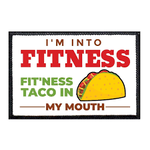insanelupus
WKR
- Joined
- Sep 2, 2015
I've been considering this alot over the last year. Specifically, what is fitness? Or better yet, what does it mean to be fit.
I looked up fitness in the 1828 Websters dictionary, then dictionary. com, just the first definition.
1828 Webster's
FIT'NESS, noun
1. Suitableness; adaptedness; adaptation; as the fitness of things to their use.
dictionary.com
fitness
noun
1. health
The 1828 idea of adaptation was intriguing, basically being adapted for a specific function.
But, I'm always chasing that goldilocks ideal, finally understanding as I get closer to 50, that there's a benefit to over all health and a moderation of trying to be strong, lean, fast, and durable/enduring. For me, fitness is s balance of these things to live life, at work, home, and the elk woods.
It's tempting though to lean in one direction or the other, trying to get leaner, stronger, more durable/ endurance, faster, etc., but when I do, I see other areas suffer.
How are you looking at fitness in your life?
I looked up fitness in the 1828 Websters dictionary, then dictionary. com, just the first definition.
1828 Webster's
FIT'NESS, noun
1. Suitableness; adaptedness; adaptation; as the fitness of things to their use.
dictionary.com
fitness
noun
1. health
The 1828 idea of adaptation was intriguing, basically being adapted for a specific function.
But, I'm always chasing that goldilocks ideal, finally understanding as I get closer to 50, that there's a benefit to over all health and a moderation of trying to be strong, lean, fast, and durable/enduring. For me, fitness is s balance of these things to live life, at work, home, and the elk woods.
It's tempting though to lean in one direction or the other, trying to get leaner, stronger, more durable/ endurance, faster, etc., but when I do, I see other areas suffer.
How are you looking at fitness in your life?


